 Petzlover
Petzlover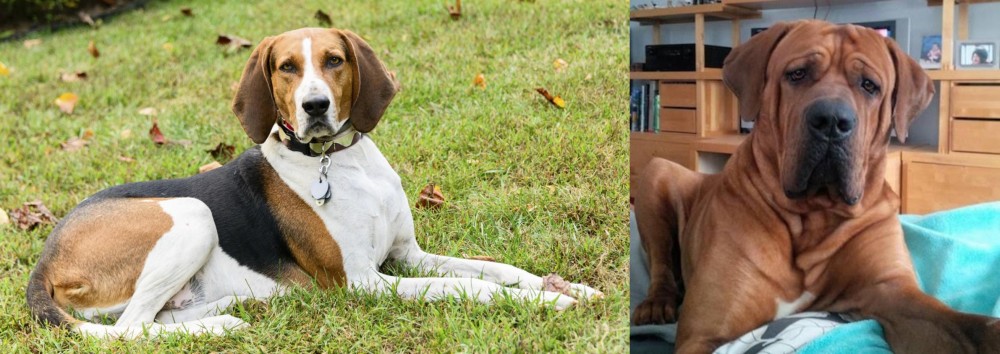 American English Coonhound is originated from United States but Tosa is originated from Japan. American English Coonhound may grow 13 cm / 5 inches shorter than Tosa. American English Coonhound may weigh 63 kg / 138 pounds lesser than Tosa. Both American English Coonhound and Tosa has same life span. American English Coonhound may have more litter size than Tosa. Both American English Coonhound and Tosa requires Low Maintenance.
American English Coonhound is originated from United States but Tosa is originated from Japan. American English Coonhound may grow 13 cm / 5 inches shorter than Tosa. American English Coonhound may weigh 63 kg / 138 pounds lesser than Tosa. Both American English Coonhound and Tosa has same life span. American English Coonhound may have more litter size than Tosa. Both American English Coonhound and Tosa requires Low Maintenance.
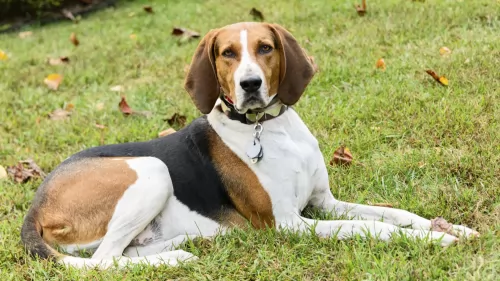 The American English Coonhound was developed in the Southern part of the United States from the variety of English hunting dogs that came to the States with the early settlers. At one point they were known as the Virginia Hound. This breed is well known for its prowess in hunting raccoons and her endurance and speed. Of course as a hound dog he loves to howl during the hunt and at home with the family. He can be frustrated and destructive if his energy and need for a job are not satisfied.
The American English Coonhound was developed in the Southern part of the United States from the variety of English hunting dogs that came to the States with the early settlers. At one point they were known as the Virginia Hound. This breed is well known for its prowess in hunting raccoons and her endurance and speed. Of course as a hound dog he loves to howl during the hunt and at home with the family. He can be frustrated and destructive if his energy and need for a job are not satisfied.
 Known also as the Japanese Mastiff, the Tosa hails from Japan. In fact, these dogs come from the Tosa Province, so the dog was named after the region where they were bred.
Known also as the Japanese Mastiff, the Tosa hails from Japan. In fact, these dogs come from the Tosa Province, so the dog was named after the region where they were bred.
It is why they are sometimes referred to as Japanese Mastiffs. The Tosa is a rare dog breed and unfortunately, the dog is still used in Japan for dogfighting.
The breed was developed in the 2nd half of the 19th century, with a number of dog breeds being involved to bring about a more powerful, braver dog.
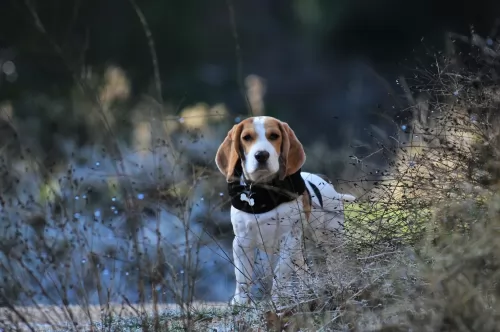 The American English Coonhound is an athlete with a deep chest and cute face. They have broad heads, domed skulls, dark eyes and soft, low ears. They are as fast and athletic as they look. These are highly athletic dogs with long legs and a slim but muscular body. They are so well built for their hunting role, that any deficiencies are quickly identified and bred out of the breed.
The American English Coonhound is an athlete with a deep chest and cute face. They have broad heads, domed skulls, dark eyes and soft, low ears. They are as fast and athletic as they look. These are highly athletic dogs with long legs and a slim but muscular body. They are so well built for their hunting role, that any deficiencies are quickly identified and bred out of the breed.
 The Tosa is a large dog, but their sizes vary, and in fact, because of their fighting, they are actually divided into light-, middleweight and heavyweight classes.
The Tosa is a large dog, but their sizes vary, and in fact, because of their fighting, they are actually divided into light-, middleweight and heavyweight classes.
Generally, you can say that these dogs weigh in the region of 54 to 90kg and they stand in height at between 62 to 82cm. The head is large, the jaws powerful, the eyes dark brown in color, the ears small, high set and floppy.
The neck is broad wit a dewlap and the tail is long, thick and tapering to a point. The coat is short and thick and is most times a rich caramel color, fawn tan, black or brindle. The dog often has a black mask.
The Tosa is a fairly quiet dog, courageous and fearless. He is going to need a strong, consistent owner who shows leadership with him. Training and socialization will be imperative for this dog.
When he has been properly reared and trained, he makes a good pet, able to get on with members of the family. He takes his role as protector and guardian seriously.
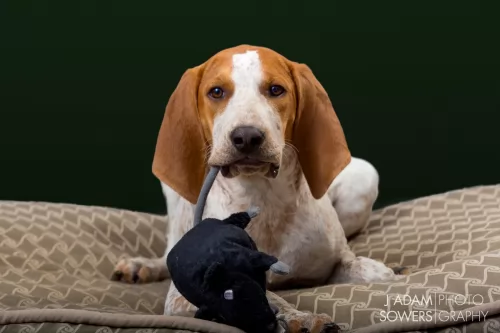 The American English Coonhound knows how to relax just as much as he knows how to work. He is mellow after work and tenacious in the chase. This is not the dog for a first-time owner. They are stubborn and hard to train. They howl and bark at home as much as they do on the hunt. They need a strong pack leader, especially when living in the city or neighborhoods.
The American English Coonhound knows how to relax just as much as he knows how to work. He is mellow after work and tenacious in the chase. This is not the dog for a first-time owner. They are stubborn and hard to train. They howl and bark at home as much as they do on the hunt. They need a strong pack leader, especially when living in the city or neighborhoods.
They are outgoing and friendly and very sensitive. They mature later than most other breeds their size. They are about 2 when they mature.
 The Tosa isn’t recommended for first-time dog owners, as in the wrong hands, they can become aggressive. Care has to be taken around children too especially undisciplined ones.
The Tosa isn’t recommended for first-time dog owners, as in the wrong hands, they can become aggressive. Care has to be taken around children too especially undisciplined ones.
He also doesn't come as recommended for small, cramped homes in the city. He’s just too big and he will need to get out and be walked often.
You want to create a home for him that ensures he is the calm, gentle dog he is capable of being, If you’re fair, firm, caring, patient and consistent, then this big dog might be for you. With the right care he becomes a gentle, devoted pet.
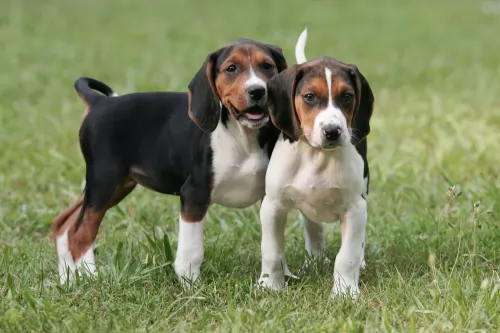 If kept active and happy, the American English Coonhound has very few health problems. The benefit from a large gen pool but do have some health concerns including elbow and hip dysplasia, ear infections, cataracts, bloat, and Progressive Retinal Atrophy. They do have a tendency to gain weight as they age. These issues will be addressed in more detail below. DNA testing is available for the dysplasia and eye issues.
If kept active and happy, the American English Coonhound has very few health problems. The benefit from a large gen pool but do have some health concerns including elbow and hip dysplasia, ear infections, cataracts, bloat, and Progressive Retinal Atrophy. They do have a tendency to gain weight as they age. These issues will be addressed in more detail below. DNA testing is available for the dysplasia and eye issues.
 The Tosa is a formidable looking molossoid, but even so, this big, calm dog can succumb to illness. Some of these diseases you need to be looking out for include bloat,hip dyslasia and eye conditions.
The Tosa is a formidable looking molossoid, but even so, this big, calm dog can succumb to illness. Some of these diseases you need to be looking out for include bloat,hip dyslasia and eye conditions.
Bloat for this dog can be life-threatening, and can often be because the dog is too hungry and he gobbles up his food quickly. Bloat is when gas can't escape, the stomach swells and twists – very dangerous. Rather give your dog two smaller meals – one in the morning and one in the evening, or even give several smaller portions throughout the day.
To help with eliminating health issues always choose a reputable Tosa breeder. You’re not likely to find one of these dogs in a dog shelter.
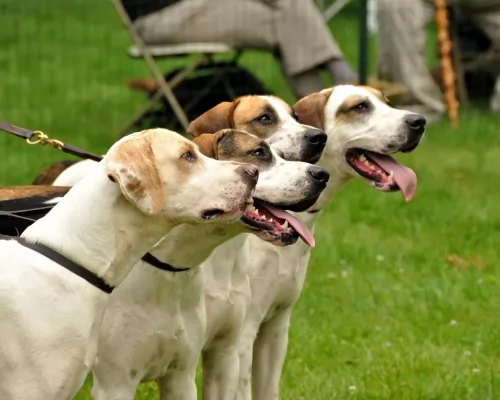 your working American English Coonhound needs different food than one who is not working. So, if you hunt with your dog remember he really needs the calories to keep his energy up. However, they can get obese as they age so cut back with less activity and more years. Watch the number of treats when training.
your working American English Coonhound needs different food than one who is not working. So, if you hunt with your dog remember he really needs the calories to keep his energy up. However, they can get obese as they age so cut back with less activity and more years. Watch the number of treats when training.
Elbow and Hip Dysplasia – the joint issues prevent the bones from connecting and functioning properly. Any good breeder of American English Coonhounds will do tests for both.
Eye issues range from cataracts to PRA (Progressive Retinal Atrophy) Again there are tests available for these conditions.
Bloat is a condition many medium to large size dogs can experience when their stomach can become inverted and intestines distended. The is a situational issue and can’t be predicted. Don’t allow your coonhound to wolf down food right before exercise and feed him more than once a day in a smaller meal.
The American English Coonhound needs a lot of exercise and has an extremely strong work and prey drive.
 These large, strong dogs do well on good quality food. If you opt to buy him commercially manufactured food, make sure it is the top quality one free of unwholesome ingredients such as preservatives, colorants and useless fillers.
These large, strong dogs do well on good quality food. If you opt to buy him commercially manufactured food, make sure it is the top quality one free of unwholesome ingredients such as preservatives, colorants and useless fillers.
Invest in the best quality ones that have nutritious minerals and vitamins. Try and give your dog some home-prepared food too – boiled chicken, brown rice or pasta, spinach, sweet-potatoes and carrots.
Never feed your dog things such as chocolates, peanuts, crisps, grapes, onion and food with spicy flavorings. This will just ensure digestive problems and having to get your dog to the vet.
The Tosa’s short coat isn’t going to require too much attention. A good brush twice a week will keep it free from loose hair and keep its shine and gleam. It’s why the dog is looked upon as being low maintenance.
Beyond that, he will need to have his nails trimmed. When brushing him, check him over for parasites – ticks and fleas, check for unusual lumps and look inside his ears for signs of redness.
These dogs are calm and fairly low-energy. Nonetheless, to maintain good health, he will need to be exercised. Ball games outside are always a good idea as well as nice long walks. Hikes into the countryside will be wonderful for this big dog.